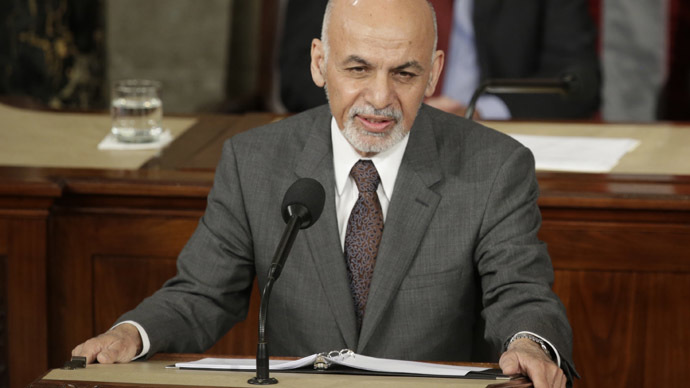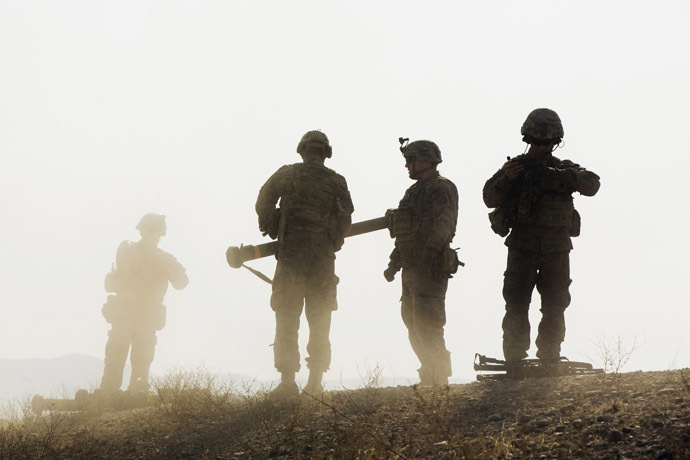Sorry, what? Afghan president says time to apologize to Taliban

After 13 years of war aimed at rooting out the Taliban, the Afghan president declared in Washington that torture and mistreatment only intensified resentment in some members of the Taliban, so it's time to heal wounds and apologize.
Speaking during his first visit to Washington, Mohammad Ashraf
Ghani, who became president last year, said peace with the
insurgents was "essential" and that some Taliban members
suffered legitimate grievances.
"People were falsely imprisoned, people were tortured. They
were tortured in private homes or private prisons," he said,
Reuters reported.
"How do you tell these people that you are sorry?" he
lamented.
In a speech to the US Congress on Wednesday Ghani said that
Taliban members could even find their way back into Afghan
society, if they agreed to respect the constitution.

The Taliban "members" said earlier this week they had no
alternative but to continue its fight against the US. They made
the statement after President Barack Obama delayed withdrawal of
the American troops until the end of 2015.
"Obama's announcement to continue to keep troops in
Afghanistan is a response to the peace efforts," spokesman
Zabihullah Mujaahid told AFP.
The US president was initially planning to cut the number of
troops to 5,000 by the end of this year, withdrawing completely
by the end of 2016. But - with the full backing of his Afghan
counterpart - Obama decided to slow the withdrawal, leaving all
9,800 in place through 2015.
Why is there such unity and accord between Ghani and Obama?
Former State Department official Matthew Hoh believes it's as
easy as pie: both need each other for their "political
survival."
"[Ghani’s] survival as president of Afghanistan is directly
related to the mass of influx of American cash and Western money
that his government receives, as well, as the presence of
American soldiers to keep him in power," Hoh told RT.
The US president, meanwhile, needs Ghani because Obama is
"facing a lot of difficulties due to his failed policy
choices in the Middle East whether it be Libya, Yemen or going
after the Islamic State… So he needs Ghani, he needs Afghanistan
to show that he is still successful, that he hasn’t given up,
that the US is still committed to fighting terrorism," Hoh
says.
Such "commitment" - the Afghanistan war - has cost the US
taxpayer nearly $1 trillion, according to Financial Times’
calculations, and will require spending several hundred billion
dollars more after it officially ended in December.
READ MORE: Will they ever leave? US to keep 9,800 troops in Afghanistan in 2015
US lawmakers, meanwhile, keep showing support for a slower
drawdown of troops.
"Iraq has shown us the consequences of leaving a fragile ally
too early," US Representative Mac Thornberry said in a
statement. "The bottom line is that our own security is at
stake," the Republican, who leads the House of
Representatives Armed Services Committee, added.
According to independent journalist Sergey Strokan, security is a
myth. The RT contributor says the American operation in
Afghanistan - the longest overseas conflict in American history -
has eventually led to a paradoxical result. As never before the
fate of Afghanistan currently lies more in the hands of external
forces – regional powers and superpowers - than in the hands of
the Afghans themselves, Strokan says.
"It is obvious that if the Americans complete their
withdrawal, it will embolden Islamic militants in both
Afghanistan and Pakistan, giving new steam to radical Islamic
movements not only in these two countries, but also in the rest
of Central Asia and even China, with the potential to create a
major threat for the nearby former Soviet republics,"
Strokan maintains.
READ MORE: Pakistan Taliban splinter group pledges support to Islamic State
The other key factor which will hardly allow the Americans to
leave Afghanistan to the Afghans is the rise of the Islamic State
in Syria and Iraq, the journalist says.
"With the emergence of ISIS, the Middle East has turned into
a testing ground for a destabilization model that will be
exported to other regions. The Syrian or Iraqi ‘model of
destabilization’ can be effectively applied in Afghanistan, with
external forces playing a key role," he warns.
2014 was the bloodiest year in Afghanistan since the UN began
compiling figures in 2009. A report published by the United
Nations in February revealed 3,699 civilians were killed in
Afghanistan in 2014, which is a rise of 730 from the previous
year. Perhaps more worryingly, there has been an increase every
year in the number of civilian deaths since 2009, figures from
the UN report show.
A powerful blast rocked central Kabul on Wednesday. Security
officials said at least six people were killed and 31 others
injured. The suicide bombing occurred in front of the Finance
Ministry and near the city’s 2nd Police Station.
Armed confrontations between militants and security forces in
Afghanistan have also intensified in recent years, as the number
of Taliban fighters has skyrocketed from 2,000 to up to 60,000,
since the US-led invasion in 2001.
On top of that, a report by Human Rights Watch in early March
said the US’s desire to have security at any cost actually gives
Afghan authorities an opportunity to act with impunity, allowing
them to get away with murder and torture.
“The previous Afghan government and the United States enabled
powerful and abusive individuals and their forces to commit
atrocities for too long without being held to account,”
HRW’s deputy Asia director Phelim Kine said.












